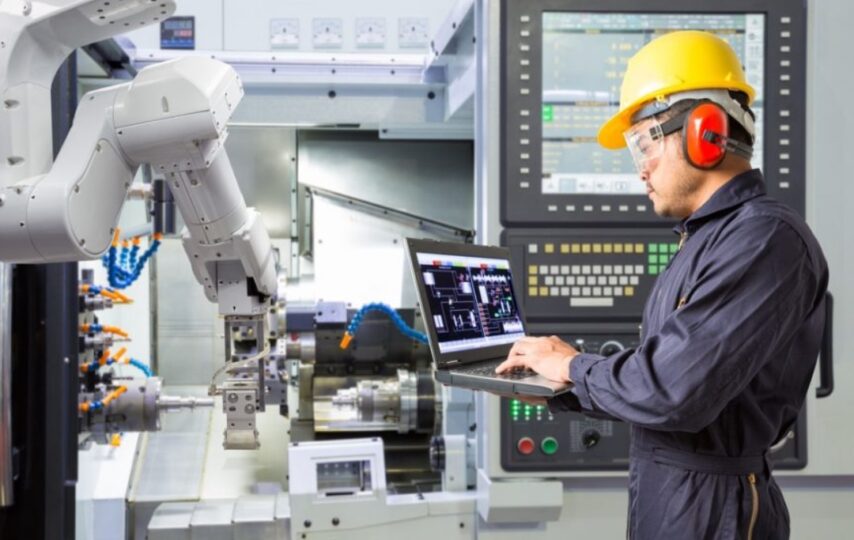Step into the era of automation where machines are dynamic forces reshaping global industries. From revolutionizing manufacturing and healthcare to transforming agriculture, logistics, and customer interactions, automation machines are driving this technological evolution. Join us on a captivating journey through their impact on various sectors uncovering innovations, confronting challenges, and unveiling future possibilities that mark this ongoing shift. Witness how these automation machines are not just changing the game but actively sculpting the modern business landscape.
Unleashing the Revolution in Manufacturing
Envision a radical transformation in the manufacturing industry, orchestrated by automation machines leading a paradigm shift. These state-of-the-art technologies go beyond streamlining production processes; they propel efficiency and product quality to unparalleled heights. The new maestros of intricate tasks are robots and automated systems, operating with precision and speed surpassing human capabilities.
Manufacturers optimize operations, cut costs, and meet market demands by automating repetitive tasks, freeing human resources for strategic roles requiring creativity and problem-solving skills. Automation’s impact spans from assembly lines to warehouses, with smart factories equipped with interconnected automation systems offering real-time insights through monitoring and data analytics.
Innovations like 3D printing, robotic arms, and autonomous vehicles rewrite the rules, introducing flexibility and customization options once deemed unattainable. Embracing automation is not merely an option; it’s a necessity for businesses striving to stay ahead in the fast-paced industrial landscape.
Shaping the Future of Labor
The integration of automation machines has significantly transformed various industries, creating both challenges and opportunities for the labor force. Let’s delve into the key aspects:
- Streamlined Efficiency: Automation fuels efficiency, streamlining manufacturing processes and slashing production times. Companies rise to meet demands while maintaining top-notch quality.
- Reduced Errors: Automation machines minimize human error, automating repetitive tasks with precision across diverse industries. Say goodbye to inaccuracies and hello to consistent, reliable outputs.
- Job Evolution:
Automation, displacing roles, prompts upskilling opportunities, reshaping the workforce. Organizations invest in training for emerging roles, fostering adaptability.
- Core Task Emphasis: In healthcare, automation frees professionals from everyday tasks, facilitating a transition to core responsibilities such as patient care. Efficiency rises, resulting in enhanced patient outcomes and satisfaction.
- Reskilling Urgency: As automation advances organizations must proactively invest in reskilling programs. This empowers workers to navigate changing roles and technological shifts, ensuring a resilient workforce in the face of automation challenges.
Innovating Healthcare with Automation Machines
Get ready to witness a remarkable transformation in the healthcare industry, all thanks to automation machines. These technologies go beyond merely streamlining processes; they are amplifying accuracy and taking patient care to unprecedented levels. Automation machines are actively addressing inventory management, medication dispensing, and even surgical procedures, thereby minimizing human error and enhancing efficiency.
Precision takes center stage with robotic surgery systems, redefining accuracy in complex surgeries and reducing recovery times. In patient care, automation ensures ongoing monitoring, precise medication administration, and tailored attention based on individual needs. The healthcare landscape is experiencing groundbreaking innovations through automation machines, promising enhanced outcomes for both patients and medical professionals.
Revolutionizing Agriculture: Tech Meets Fields
Automation has reshaped agriculture, revolutionizing the way farmers plant, monitor, and harvest crops. Drones and robots have become important, empowering farmers to increase efficiency and productivity significantly.
Notably, precision agriculture techniques take center stage, allowing farmers to optimize water and fertilizer usage.
These technologies foster sustainable practices while maximizing yields. Automated systems play an important role in actively collecting extensive data on crop health and growth patterns. This information enables farmers to make real-time, informed decisions, promptly addressing any issues.
The reduction of manual labor through automation not only slashes costs for agricultural businesses but also significantly amplifies overall output. This shift goes beyond merely boosting productivity; it raises food quality, benefiting consumers worldwide. The era of automated agriculture is undeniably a game-changer.
Redefining Transportation and Logistics
Hold onto your seat as automation reshapes the transportation and logistics industry. Self-driving vehicles and automated warehouses are the new norm, revolutionizing how goods move efficiently and safely. Automation in transportation ensures accurate route planning, reduced delivery times, and overall operational efficiency.
Advanced algorithms and real-time data analysis optimize supply chain management, pushing the boundaries of efficiency. In logistics, automation machines, from robotic arms to drones, are streamlining tasks with speed and precision. As technology advances, we can expect innovations in autonomous vehicle technologies, transforming global product movement while enhancing safety standards and reducing environmental impact.
Automated Customer Service: A Game-Changer
Welcome to the world of automated customer service, where efficiency meets enhanced customer experiences. Automation machines streamline support processes, providing quick solutions to customer inquiries 24/7. These systems handle repetitive tasks, allowing human agents to focus on complex issues.
Artificial intelligence and machine learning make interactions personalized, ensuring faster response times and accurate information, ultimately boosting customer satisfaction. Automated customer service isn’t just about cutting costs; it’s about crafting a seamless customer experience, making every interaction timely and resolutions precise.
Challenges and the Path Forward
As automation reshapes industries, challenges emerge:
- Impact on Jobs: The potential displacement of human workers raises concerns about job loss and sparks questions about retraining programs for roles automated.
- Cost of Implementation: Initial costs of adopting automation technology may hinder smaller businesses, facing significant upfront investments. Employee resistance due to fear of job loss or technology overwhelm is an additional challenge.
- Battling the Cybersecurity Storm: The surge in connectivity among automation machines through IoT devices raises the specter of cybersecurity threats. Fortifying our defenses with robust security measures becomes important to shield sensitive data and thwart disruptions caused by cyberattacks.
- Navigating the Ethical Frontier: As automation strides forward, it sparks an important conversation on ethics—how do we ensure accountability and unbiased decision-making in autonomous systems? The answer lies in establishing transparent and ethical frameworks, an important shield against unintended consequences or biases.
Facing these challenges is not a choice but a necessity as industries embrace automation, serving as the compass for heightened efficiency and competitiveness in the ever-evolving business landscape. Ready or not, the future demands proactive solutions!
The Future Unveiled: Possibilities and Predictions
Hold onto your expectations as we gaze into the crystal ball of automation’s future. Predictions abound, from increased efficiency and precision in manufacturing to robots assisting in delicate surgical procedures. Agriculture sees drones and machinery optimizing resource management, while transportation and logistics move towards streamlined, autonomous services.
Artificial intelligence in customer service promises efficiency and personalized interactions, but addressing concerns about job displacement remains important. Despite challenges, the ongoing transformation brought about by automation machines offers exciting opportunities for innovation across various sectors.
Conclusion: The Symphony of Industry Transformation
As automation machines continue their evolutionary journey, industries undergo a symphony of transformation. The undeniable impact spans manufacturing, healthcare, agriculture, and transportation. While challenges accompany this technological shift, the benefits of efficiency, productivity, and innovation are too promising to overlook.
Adapting to these changes becomes not just essential but the key for businesses and workers to remain competitive and flourish in this new era of industry evolution. The potential for growth and development through automation is vast, paving the way for exciting advancements yet to unfold. The ongoing transformation, driven by automation machines, signifies an important moment in history where technology redefines industries.
Embracing this change is important for organizations aiming to stay ahead in a rapidly evolving landscape where innovation prevails. With careful planning and collaboration between humans and machines, we stand on the cusp of a future brimming with boundless possibilities and unprecedented progress across all sectors of industry. So, fasten your seatbelts, and let’s embark on this wave of innovation together!



